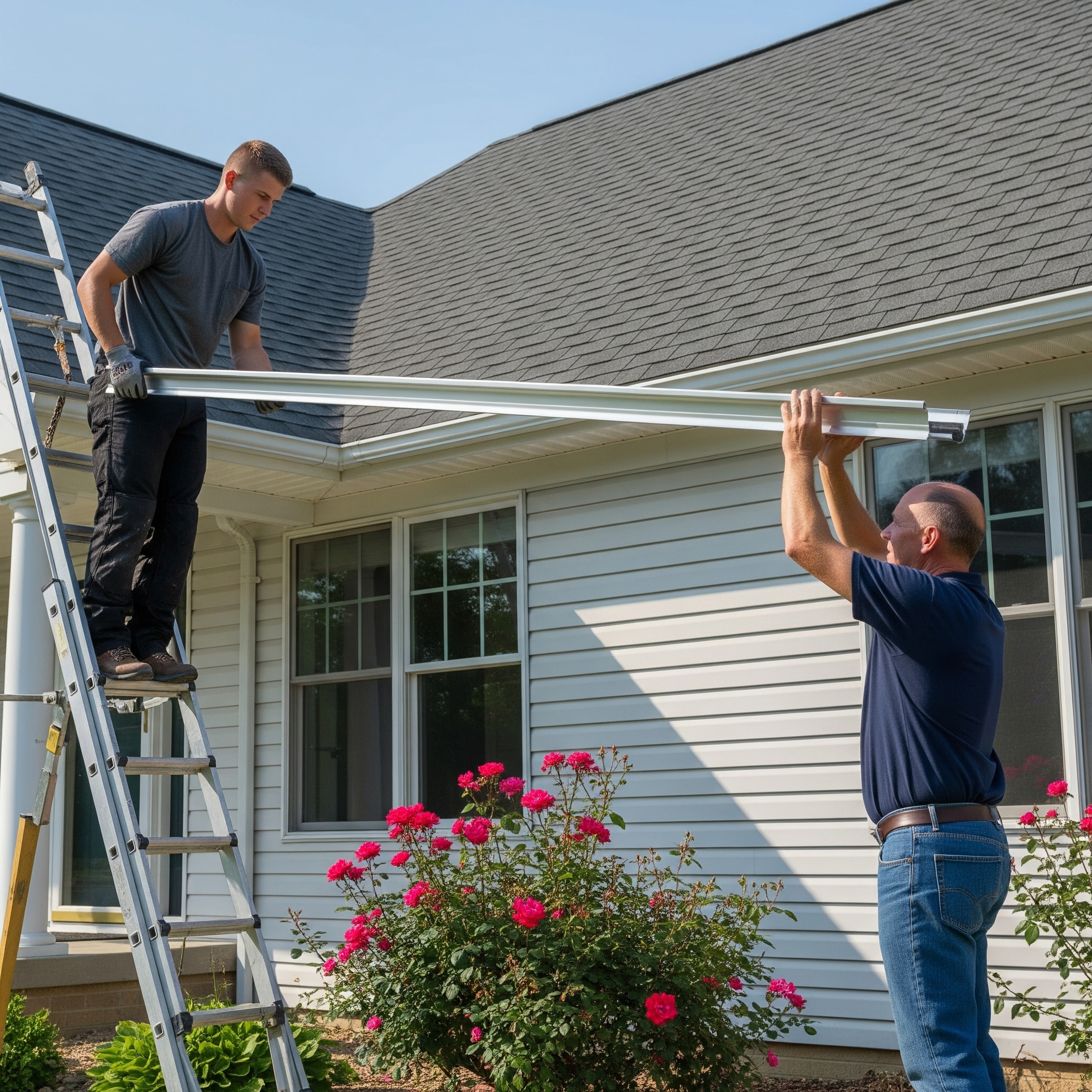Table of Contents
Win more bids. Close more jobs. Start with our newsletter.
Get exclusive insights, tips, and trends your competition doesn't want you to know.
Ever watch a homeowner's face when you show up with a clipboard and a pencil stub? It's not exactly the "wow, these guys are professionals" expression you're hoping for. Compare that to the contractor who arrives with a sleek tablet, pulls up detailed property information, and creates a comprehensive estimate right there on the spot. Guess who's getting the job?
Here's the reality: in 2024, your tech stack isn't just about internal efficiency—it's your secret weapon for building the kind of homeowner trust that translates directly into signed contracts and premium pricing. The roofing companies that are absolutely killing it (and I'm talking about the ones pulling in $4M+ annually with 40%+ profit margins) understand something crucial: trust is built through every single touchpoint, starting with that first impression.
The difference between a roofing company that homeowners trust and one they're skeptical about often comes down to one thing: how organized and professional their communication feels. And that's where your technology choices make or break your reputation.
The Trust Gap: Why Homeowners Are Skeptical
Let's address the elephant in the room. Homeowners don't automatically trust contractors, and frankly, they shouldn't. The industry has earned its reputation for poor communication, missed deadlines, and surprise costs. But here's the opportunity: when you operate differently, you stand out like a beacon.
Think about your own experiences as a consumer. When you're dealing with a company that has their act together—they remember your preferences, they update you proactively, they deliver exactly what they promised—how does that make you feel? Confident, right? That's the feeling you want to create for every homeowner you work with.
Your tech stack is like your business's nervous system. When it's working properly, information flows smoothly, nothing gets forgotten, and every interaction feels intentional. When it's not, well, you get the contractor stereotype: disorganized, unprofessional, and unreliable.
The Modern Homeowner's Expectations
Today's homeowners aren't just comparing you to other roofers—they're comparing you to Amazon, Apple, and every other company that's set the bar high for customer experience. They expect real-time updates, transparent pricing, and professional communication. They want to feel like they're working with a legitimate business, not someone who's winging it.
This is where reading crm reviews for small business becomes crucial. You're not just looking for software; you're looking for a platform that helps you meet these elevated expectations. The best roofing CRM doesn't just organize your data—it transforms how customers perceive your entire operation.
Strategic Tech Stack Building: The Foundation First
Building a tech stack is like constructing a house—you need a solid foundation before you add the fancy features. For roofing companies, that foundation is your customer relationship management system. Everything else—estimation tools, scheduling software, payment processing—should integrate seamlessly with this central hub.
Here's what most small business CRM reviews miss: the system you choose needs to work the way roofers actually work. You're not sitting in an office all day entering data. You're on roofs, in trucks, meeting with customers in their driveways. Your CRM needs to be mobile-first, intuitive, and designed for the chaos of field work.
The Core Components That Matter:
Customer Intelligence Platform: This goes beyond basic contact information. You need a system that tracks every interaction, preference, and concern. When you call Mrs. Anderson about her estimate, you should immediately see that she's worried about protecting her newly planted garden and prefers communication via text message.
Mobile Estimation Engine: The days of "I'll get back to you with a price" are over. Professional contractors create detailed estimates on-site, with visual aids and clear breakdowns. Your estimation tool should connect directly to your CRM, automatically saving all customer data and project details.
Communication Automation: Not the robotic kind that makes customers feel like numbers, but intelligent automation that ensures no one falls through the cracks. When you promise to follow up in three days, your system should make sure it happens.
The Professional Presentation Factor
Here's something that might surprise you: homeowners often decide whether to hire you within the first 10 minutes of meeting you. That decision is based on how professional and organized you appear. Your tech stack is your opportunity to make that first impression count.
When you arrive at a property and immediately pull up detailed information about their specific situation, reference previous conversations, and create a professional estimate on the spot, you're not just being efficient—you're demonstrating competence. Homeowners think, "If they're this organized about the estimate, they'll probably be organized about the actual work."
The best roofing CRM systems understand this psychology. They're designed to make you look good in front of customers, with clean interfaces, professional-looking reports, and seamless functionality that never makes you fumble around looking for information.
Integration: The Make-or-Break Factor
This is where a lot of roofing companies get it wrong. They choose tools that don't play well together, creating information silos that actually make things more complicated. You end up with customer information in one system, photos in another, estimates in a third, and project management in a fourth.
Imagine trying to cook a complex meal with all your ingredients scattered across different kitchens. That's what it's like trying to manage customers with disconnected tools. The most successful roofing companies use integrated systems where information flows seamlessly between all components.
When you're evaluating small business CRM reviews, prioritize systems that integrate with the tools you already use or plan to use. Your CRM should talk to your estimation software, your scheduling system, your accounting platform, and your marketing tools. When everything connects, magic happens: contracts automatically create project timelines, completed jobs trigger follow-up sequences, and happy customers get added to referral campaigns.
The ROI Reality Check
Let's talk numbers for a minute. When you're looking at crm reviews for small business, it's easy to get sticker shock. Quality systems aren't cheap. But here's what successful contractors understand: the cost of not having organized systems is way higher than the cost of implementing them.
Consider this: if better organization and communication helps you close just one additional project per month, what's that worth? If automated follow-up systems help you capture leads that would otherwise slip through the cracks, what's the value? If professional presentation allows you to charge premium pricing, how does that impact your bottom line?
The roofing companies in our Peak Performance report that are hitting those 40%+ profit margins aren't just good at installing roofs—they're obsessive about their systems and processes. They track metrics like response time to leads, conversion rates from estimate to contract, and customer satisfaction scores. They know that investing in technology isn't an expense—it's a competitive advantage.
Implementation: The Gradual Approach
Here's the thing about implementing new technology: try to do everything at once, and you'll overwhelm your team and frustrate your customers. The smartest approach is gradual implementation, starting with your biggest pain points.
Most roofing companies should start with customer management and estimation tools. Get those working smoothly, train your team thoroughly, and then gradually add additional components. This approach lets you see immediate benefits while building toward a more comprehensive system.
During implementation, focus on the features that directly impact customer experience. Your team can learn advanced features over time, but your customers will notice improvements in communication and professionalism immediately.
Measuring What Matters
When you're reading small business CRM reviews, pay attention to reporting and analytics capabilities. You can't improve what you don't measure, and there are specific metrics that correlate directly with profitability in the roofing industry.
Track your lead response time, estimate-to-contract conversion rate, project completion times, and customer satisfaction scores. The best roofing CRM systems make these metrics visible and actionable, helping you identify opportunities for improvement.
The Competitive Reality
Here's the bottom line: while you're debating whether to invest in better technology, your competitors are already implementing it. The contractors who recognize that homeowner trust is built through professional systems and clear communication are capturing market share from those who think good work is enough.
The roofing industry is professionalizing, and homeowners' expectations are rising. The companies that get ahead of this trend will dominate their markets. Those that don't will find themselves competing solely on price, which is a losing game.
Your tech stack isn't just about organization—it's about positioning your company as the professional choice. When homeowners feel confident in your systems and processes, they're willing to pay premium prices for that peace of mind. That's the difference between surviving and thriving in today's competitive market.



Blog / Guide Title CTA
Once you've created a strong Linkedin profile, you can leverage it as part of your broader marketing strategy. Use your Linkedin to share content, join industry groups, and network with others in the contracting space.
If you're looking for additional marketing support, consider partnering with JobNimbus Marketing to maximize your business growth. Schedule a call with our team to learn how to boost your marketing efforts today.

Blog / Guide Title CTA
Once you've created a strong Linkedin profile, you can leverage it as part of your broader marketing strategy. Use your Linkedin to share content, join industry groups, and network with others in the contracting space.
If you're looking for additional marketing support, consider partnering with JobNimbus Marketing to maximize your business growth. Schedule a call with our team to learn how to boost your marketing efforts today.

Download Our Free Tips for Recession-Proofing Your Company
We’ll show you five simple things you can do to help your business survive a recession.









